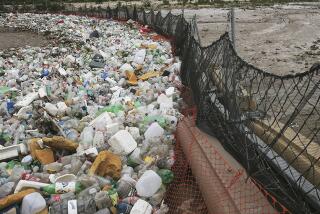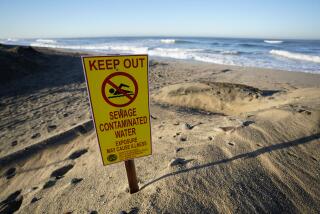Huge Plane Repair Plant Planned for Tijuana : Airlines: The $200-million project is a joint Hong Kong-Mexican venture. It hopes to cash in on the global shortage of maintenance facilities.
- Share via
Hoping to profit from a worldwide shortage of airliner maintenance facilities, a Hong Kong-Mexican joint venture announced plans Monday to build a giant, $200-million repair facility adjacent to Tijuana International Airport.
The venture, Matrix Aeronautics SA. de C.V., is 60% owned by Danbridge Ltd. of Hong Kong and 40% owned by Carlos Bustamante, a Tijuana industrialist with real estate, natural gas and manufacturing interests. Investors said they also will seek part-ownership by U.S. airlines and aircraft leasing companies.
The plant, to be completed in mid-1992, will aim to attract U.S., Far Eastern and Mexican carriers for repairs and will specialize in Boeing commercial airliners, said Samuel Bretts, executive vice president of Grupo Bustamante in Tijuana.
The aging of the worldwide commercial airliner fleet, the 1980s boom in passenger traffic and tighter maintenance requirements adopted in the last year by the Federal Aviation Administration have strained domestic maintenance facilities, industry officials said Monday.
As a result, more U.S. carriers rely on third-party providers, said Jack Feir, president of Jack Feir & Associates of Huntington, N.Y., a consulting firm specializing in aircraft inspections and appraisals.
Airlines “have not been building new facilities, and now their airplanes are needing more work than they anticipated,” he said. “It was once thought that airliners would only last 15 years and then you’d retire them. But the world is full of 25-year-old airplanes, and they need more care.”
Warning of impending maintenance facility problems, Air Safety Week, a Washington newsletter, said Monday that 1,400 of the 4,000 commercial airliners in the U.S. fleet will need major repairs in the next four years to comply with new FAA regulations. It added: “While the number of facilities capable of doing the work is increasing, the repair industry is still operating at near capacity.”
The Tijuana facility hopes to help with that demand, using as an inducement lower cost labor and proximity to the United States, Bretts said.
It also would become the first in Mexico suited to heavy repairs of Mexican airlines; Aero Mexico and Mexicana airlines now send planes to Brazil for Class D mainframe overhauls, Bretts said.
The plant would consist of three, 100-foot-tall hangars, each with 400,000 square feet of floor space; each would be big enough to accommodate two Boeing 747s at once. The facility will be built on 70 acres owned by the Mexican government.
Bretts said the Tijuana facility will need cooperation from Seattle-based Boeing, whose officials said Monday that they know nothing of the plant or if the company may be interested in acquiring an ownership interest. Boeing ships parts to foreign repair facilities, but only if they are FAA-approved and if client airlines request parts be sent, a spokesman said.
To work on aircraft flying U.S. air routes, the Tijuana facility must hire mechanics and supervisors approved by the FAA and receive a special designation. The agency has granted 262 of the special designations, so far, said spokeswoman Elly Brekke in Los Angeles.
In the United States, there are about 4,000 FAA-approved aircraft facilities, only a fraction of which are licensed for Class D mainframe overhauls, work that grounds planes for months, Bretts said.
The facility, which would employ more than 3,000, was announced in Hong Kong by Mexican Secretary of Commerce Jaime Serra Puche, who was on a trade mission with Mexican maquiladora owners.
United Press International contributed to this report.
More to Read
Inside the business of entertainment
The Wide Shot brings you news, analysis and insights on everything from streaming wars to production — and what it all means for the future.
You may occasionally receive promotional content from the Los Angeles Times.










